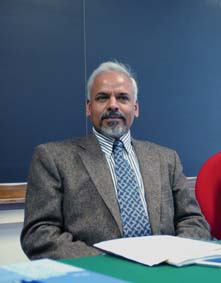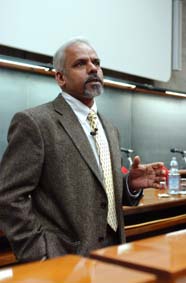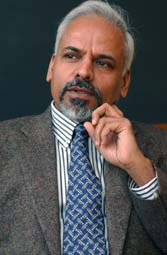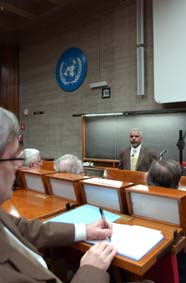Personal tools
News from ICTP 103 - Features - KR Sreenivasan

Katepalli R. Sreenivasan, a physicist who has earned an international reputation for his studies of statistical physics and turbulence, has been appointed director of ICTP. In a recent interview, Sreenivasan spoke about his hopes and plans for the institution that he is about to lead. Excerpts follow.
Katepalli R. Sreenivasan
for Scientific Excellence
What prompted you to apply for and
accept the position of ICTP director?
When I was about 12 or 13, my family priest taught me a prayer
and said that I was to recite it 108 times a day: one hundred
for myself and eight for the rest of humanity. If I did not find
the time for 108 recitations, I should do 58, 50 for myself and
eight for humanity. And if I couldn't do 58, I should do 33, 25
for myself and eight for humanity. The point is that no matter
how much or how little one does for oneself, one should always
contribute a constant amount for humanity. Coming to ICTP and
furthering its causes may be my way of contributing to the rest
of humanity.

What do you view as the ICTP's greatest strengths?
On the whole, the science done here is very good. In Italy,
the scientific institutions in Rome, especially in physics and
mathematics, are generally regarded as the nation's best. But,
according to the opinions I have gathered, ICTP and the rest of
the scientific institutions that comprise the Trieste System rank
very high in quality. In the world at large, there are a few other
institutions with visitor programmes similar to those found at
the ICTP--for example the Institute of Theoretical Physics at
Santa Barbara, and the Newton Institute at Cambridge, UK. Yet
ICTP is unique in its mandate, which involves not merely serving
the global scientific community but paying particular attention
to the needs and concerns of scientists from the developing world.
ICTP must attract and retain the best scientific talent that it
possibly can and, at the same time, promote and support world-class
science in the developing world. Excellence is at the heart of
what the Centre does and that is what I intend to support during
my tenure in Trieste. I should also emphasise that the centre's
excellence is in no small measure due to the work of its dedicated
staff.
What strengths do you bring to the job?
I think it would be better for others to make that judgement.
In general, I think I pay close attention to details; I try to
make decisions in a transparent way so that even those who don't
agree with me can see how I arrived at that particular conclusion;
I am inclusive, show commitment to my job and follow through.
Since my appointment was announced, I've been encouraged by the
large number of messages received from people affiliated with
the Centre. Many have expressed their enthusiasm for the appointment.
As a result, I begin my tenure with much good will that I hope
I can capitalise on.

ICTP operates under a tripartite agreement between the Italian
government, the United Nations Educational, Scientific and Cultural
Organization (UNESCO), and the International Atomic Energy Agency
(IAEA). How do you view the relationship with each of these institutions?
ICTP's relationship with the Italian government and the Italian
scientific community is very good. I have met a few government
officials, including the Italian ambassador to UNESCO, Francesco
Caruso, and they have expressed nothing but praise for the Centre's
work. Their interest, I think, is driven by two overall concerns.
First, they want to be proud of the Centre and its contributions
to science, especially in the developing world. They want the
Centre to do its job well. Second, I think that they would like
ICTP to become better known among the Italian citizenry. That
is something I intend to work on. The Italian government has been
generous in its support to ICTP and it is quite reasonable for
them to expect that the public knows as much as possible about
the Centre. ICTP has good working relationships with Trieste's
other scientific organisations, often sharing their resources
and expertise in ways that make the entire system stronger than
any of its individual components. I support that. ICTP's relationship
with IAEA is strong and I think the increased number of joint
activities now taking place have added value and strength to this
partnership. Yet IAEA understands the need for academic freedom
within ICTP. As for UNESCO, there is enormous potential to tap
in terms of the avenue it provides to its member states. I fully
intend to capitalise on this advantage. Conversely, I think UNESCO
can tap ICTP's scientific expertise to its advantage in a number
of ways. There's a great deal of common ground worth exploring
that, if cultivated properly, could serve the goals of both organisations
well. In early discussions with UNESCO, we have agreed to work
closely on several activities.
You intend to continue and hopefully expand your own research
at the Centre. Could you explain the broad focus of your research
and how you plan to pursue it in Trieste?
Broadly speaking, my area of research involves the understanding
of a wide range of nonlinear and nonequilibrium problems, with
a focus on turbulent flows. I was the founding chairman of the
American Physical Society's Topical Group on Statistical and Nonlinear
Physics. There are people at the ICTP and next door at the International
School for Advanced Studies (SISSA) doing related research in
these broad areas, and I see myself developing close ties with
them. In Italy, there are people in Rome, in particular, but also
in Milan and Padua, who have conducted worldclass research in
these areas and I intend to interact with them. On an international
level, I have worked in India, Australia, the United States, and
a few other places, forging close collaboration with a broad range
of people within my field. Here, too, I plan to maintain my contacts.
As a result, my research at the Centre will not only be connected
to ICTP but to scientific communities in Italy, Europe, and the
rest of the world. This approach conforms to the spirit of international
science, which is not confined to one neighbourhood but is welcomed
in many places around the world.

What, specifically, has your research on turbulence entailed?
My research includes turbulence in the atmosphere, oceans,
aerodynamics, blood vessels, and even home-heating systems. The
major challenges facing those studying turbulence is to understand
how properties vary as a control parameter is increased and to
relate these aspects to the governing equations. This is the spirit
of my work. One specific problem my colleagues and I have been
working on recently is thermal convection: studies of the motion
of fluid to better understand how thermal energy is transported
from one part of a system to another-say, from the centre to the
edge of the sun; or from the centre to the surface of the earth;
or, more simply, from the bottom to the top of a heated pot of
water. Typically, the experiments consist of a container with
fluid (helium at a few degrees Kelvin) that is heated on the bottom.
The fluid on the bottom of the container expands and becomes lighter,
causing it to rise to the top. Meanwhile, the fluid at the higher
levels of the container, which is colder and denser, tends to
sink to the bottom. This creates a continuous motion representing
a form of turbulence. The description makes the process sound
deceptively simple but it is not. For example, small changes in
boundary conditions can lead to dramatic changes in behaviour
that are far from easy to understand.

The challenges that ICTP faces today are vastly different
from those the Centre faced at its inception. How should ICTP
respond to these challenges?
If you read some of the speeches that ICTP's founding director,
Abdus Salam, gave during the 1960s and 1970s, you come across
passages praising the Soviet Union's scientific enterprise and
suggesting that other nations, particularly developing nations,
carefully examine those efforts for guidance in designing their
own scientific enterprises. Salam, of course, was not the only
person expressing this opinion. The same argument today would
carry less weight. You simply cannot talk about science organisations
in the same political and social context in which they were debated
30 or 40 years ago. Nevertheless, when ICTP was launched, the
cold war was in full tilt and the Centre served as a forum where
fruitful East-West exchanges took place. Now the scientific community
faces challenges that sometimes have a similar slant: most notably,
the inability of scientific communities to interact because of
political and diplomatic circumstances beyond their control. For
example, scientists working in universities and government research
laboratories in the United States would like to interact with
scientists from Iran at conferences and other events. But such
interaction has proven difficult because of the severed diplomatic
relations between the two nations. There is no reason why ICTP
could not serve as a bridge between the scientific communities
in these two nations in much the same way that it served as a
bridge between the East and West during the cold war. ICTP's first
and foremost functions must be to do and develop good physics,
but in the process it can serve as a facilitator promoting mutual
understanding among nations, especially those that are isolated
from, and suspicious of, one another. ICTP, after all, is part
of the larger world and it simply cannot ignore what divides and
endangers humanity. On another front, when ICTP was created some
40 years ago, the state of science throughout the developing world
was not advanced. Today the situation is different. Some countries,
like South Korea, have done very well. China and India, for example,
have a few scientific institutions that rank among the best in
the world. Yet, the quality of basic science in these same countries
is still far from uniform, and has actually declined in some instances.
Some other countries have done worse. As a result, today, there
is no single strategy for promoting science in the South, and
ICTP has to devise different innovative policies for different
countries. Whether we should target some countries and work more
diligently with them may be something to consider. I am not sure
this is the best way to proceed but it is unrealistic to think
that one can elevate every country to a high level of scientific
excellence in a short time. We must understand the needs of different
countries and devise different strategies. If history is any guide,
the Centre can make a tremendous difference, and I look forward
to being part of this effort.